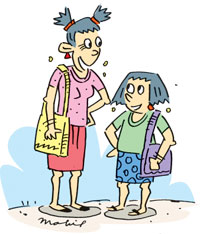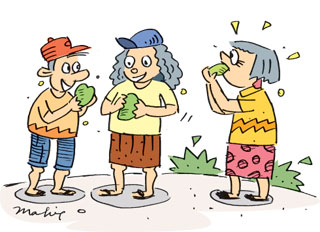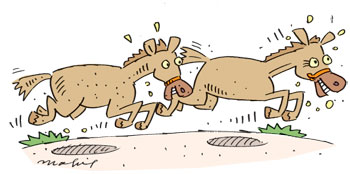|

by R. S. Karunaratne
Fresh look at
articles
The articles belong to a group of words called 'Determiners'. There
are only three articles in the English language.
The definite article: The
The indefinite articles: a, an
Articles show whether we are talking about things that are known to
both the speaker and the listener, or that are not known to both of
them. However, the use of articles is one of the most difficult areas in
English. Here is a simplified guide.
1. We do not use 'a' or 'an' with plural or uncountable nouns.
|

Are you Shyama’s daughter? |
Some people tell lies.
Children love to eat mangoes.
There are many vehicles in Sri Lanka.
I need some stamps to post these letters.
You should drink water after meals.
2. We do not use 'the' to talk about things in general.
Dogs can swim.
Elephants roam in the jungle.
Kerosene is useful for poor people.
Books are expensive.
Newspapers are cheap.
3. We do not use articles with 'my', 'this' or other determiners.
His work is boring.
You have to solve this problem.
I lost my purse.
Your book is on the table.
Their cheques are ready.
4. We do not use singular countable nouns without an article or other
determiner.
The dog is barking.
She keeps a cat as a pet.
Hema is a doctor.
Premil is an engineer.
The elephant has a huge body.
5. We do not use 'the' with uncountable or plural nouns when we refer
to them in general.
Petrol is expensive.
Life is a struggle.
My friend loves dogs.
Horses can run fast.
|

Children love to eat mangoes.
|
Birds are innocent creature.
7. We use 'the' before a singular, plural or uncountable noun when
our listener or reader knows what we are referring to.
I am going to the bank.
Is there a communication centre here?
I didn't like the play.
Let's go and see a film.
Mother has washed the clothes.
8. We use 'the' when there is only one in our part of the world. In
other words, they should be unique.
The sun rises in the east.
People used to think that the earth was flat.
We must support the Government.
The future is uncertain.
The world is changing everyday.
9. We usually use 'the' with superlatives.
Everest is the highest mountain.
Anura is the tallest boy in my class.
All of us went to the best school in Colombo.
He wants to buy the most expensive camera in the market.
Is Bill Gates the richest man in the world?
10. We do not use 'the' with possessives and demonstratives.
This is my teacher.
Are you Shyama's daughter?
Do you like this drink?
We live in our uncle's house.
This shirt is too big for you.
11. We do not use 'the' with proper nouns.
Swarna is one of my neighbours.
His name is Sherlock Holmes.
Sri Lanka is a beautiful country.
Australia is the smallest continent.
Current
English usage
English is a living language and its expressions are subject to
change from time to time. Be familiar with the following words and
expressions.
1. Envelop and Envelope
Envelop, means 'to wrap up' or 'to enclose'. I saw mist enveloped
hill tops in Nuwara Eliya, Envelope is a paper wrapper for a letter. She
put the application form in an envelope and posted it.
2. Enviable and envious
Enviable means 'arousing envy'.
Margaret led an enviable lifestyle after returning from France.
Envious means 'showing or expressing envy'. Some of the villagers
were envious of her wealth.
3.Esq
Esq is the abbreviation for Esquire which is rarely used today. In a
formal letter addressed to a man Esq was used in the following manner:
G. B. Samaranayake Esq. However, Esq should not be used with Mr.
4.et al
Et al is the abbreviation of the Latin phrase etalii. It means 'and
others. ' It is used in legal and formal expressions. Premasiri, Jayalal,
Henry et al were charged with smoking in a public place.
5. etc
etc is the abbreviation for the Latin phrase etcetera. It means 'and
other things.' She bought potatoes, onions, carrots etc for the
almsgiving.
6. Ethnic
Ethnic means 'of a group of people classified according to race or
nationality. India is a country with a wide variety of ethnic groups.
Loosely it means 'relating to race'. Sri Lanka did not have an ethnic
conflict.
7. Evade and avoid
Evade means 'to keep away from somebody by deceitful means. Most
criminals try to evade the police.
Avoid means 'to keep away'. Children should avoid places where
gambling takes place.
8. Tax avoidance and tax evasion
Tax avoidance means 'the legal non-payment of tax by clever means?
Some businessmen are guilty of tax avoidance. Tax evasion means 'the
illegal means of avoiding tax by dishonest means'. Tax evasion is common
in third world countries.
9. Even
Even should be placed immediately before the word it refers to in
order to avoid ambiguity. Some students do not even read their text
books.
10. Everyone and every one
Everyone wants to go home now.
Every one of the students wants to go home.
Starters :
Adjectives of
comparison
We use comparative adjectives to compare two nouns. We use
superlative adjectives to compare more than two nouns.
Comparative adjectives
Amara is taller than Sita.
Anolis is fatter than Murid.
|

My horse is more active than yours.
|
John is brighter than Sena.
Metal is heavier than cotton.
Feathers are lighter than iron.
We usually use ‘er’ endings for one-syllable and two syllable
adjectives with three or more syllables, we use ‘more for to form the
comparative.
Susila is more beautiful than Dilini.
Edwin is more intelligent than Sarath.
My horse is more active than yours.
A Rolls Royce car is more expensive than a Maruti.
Romeo Juliet is more interesting than Macbeth.
The superlative adjectives are formed by adding ‘est’.
Nita is the tallest girl in her class.
Kavindu is the brightest student in his school.
Everest is the highest mountain in the world.
The happiest man lives in the United States.
The longest river is in Africa.
With some two-syllable adjectives and adjectives with three or more
syllables we use ‘most’ to form the superlative.
Elvis was the most popular singer.
Alwis is the most forgetful boy in my class.
The principal commended the most intelligent student.
Rosy was the most beautiful girl in her school.
For some students logic is the most difficult subject.
NOTE: We cannot use the ‘er’ ending and the ‘more’ form together.
Activity
Fill in the blanks with the correct forms of the adjectives in the
brackets.
Check your answers with the key.
1. Malini is ........... (clever) than Pearl.
2. Rohini is ........... (talkative) than Shanika.
3. The tiger is ......... (dangerous) animal in the jungle.
4. Silk is ............ (fine) than cotton.
5. A king is .......... (power) than a beggar.
[Key]
1. cleverer
2. more talkative
3. the most dangerous
4. finer than
5. more powerful |

